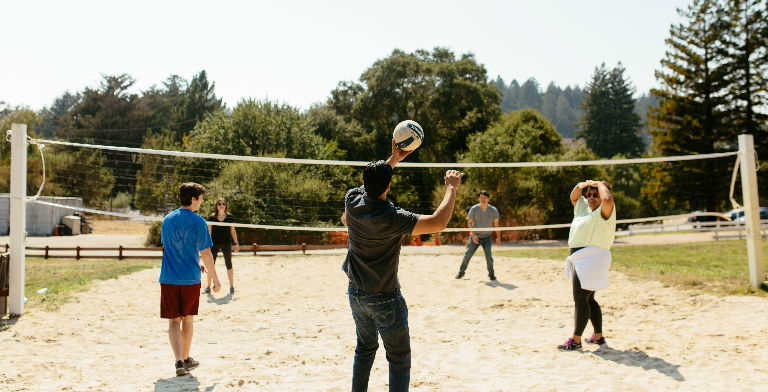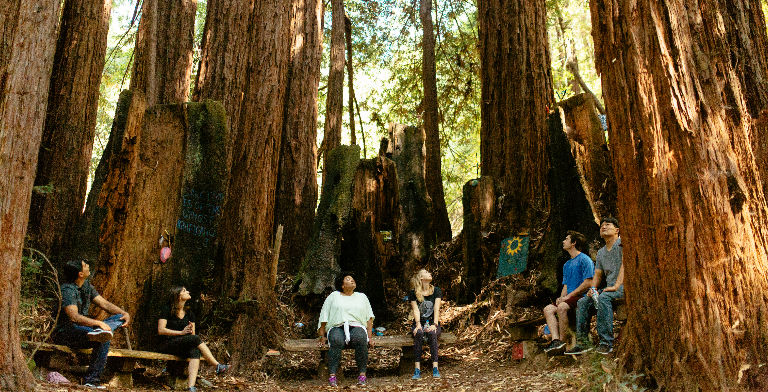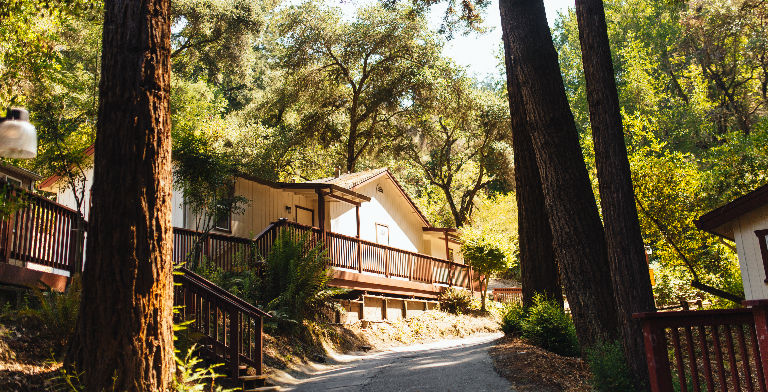The Camp Recovery Center helps adults struggling with cocaine addiction find long-term recovery. Located near Scotts Valley & San Jose, CA, The Camp provides premier cocaine abuse rehabilitation.
Cocaine Abuse Rehab
Cocaine Abuse Rehab Near Santa Cruz & San Jose
Cocaine addiction is associated with a wide range of physical, mental, emotional, and socio-economic damage, yet the behavior remains unfortunately prevalent. Experts estimate that about 35 million Americans have abused cocaine at least once in their lives and that about two million people are current users of cocaine, which means that they have abused the drug at least once in the previous 30 days.
Typically ingested by being snorted, smoked, or injected, cocaine triggers the brain to release a flood of dopamine, a neurotransmitter that is associated with pleasure. The result is an intense yet temporary rush of energy, euphoria, and confidence. However, these pleasurable effects are accompanied by significant risks, including the development of tolerance and dependency. Cocaine abuse leads to about 450,000 visits to emergency rooms every year, and results in more than 4,000 annual deaths.
At The Camp Recovery Center, we have developed specialized cocaine addiction treatment that has proved to be particularly effective at helping adults overcome an addiction to cocaine. With a premier location in the San Jose & Santa Cruz area, as well as more than 30 years of successful cocaine addiction treatment, we are uniquely prepared to provide comprehensive rehab that will lead to long-term recovery.
Helping a Loved One
Helping a Loved One or Family Member Enter Cocaine Abuse Rehab
In too many cases, the despair of watching a loved one struggle with cocaine addiction is compounded by perceived helplessness. If you are currently in this situation, know that you are not powerless to effect positive change. You can take action that will make a difference in your loved one’s life. Consider doing the following:
- Educate yourself. As you learn more about cocaine abuse and addiction, you will develop a greater understanding of the challenges your loved one is experiencing, and you will be better prepared to provide meaningful support.
- Explore treatment options. As you increase your understanding of the types and levels of services that are available, you will be able to identify programs that best meet your loved one’s specific needs.
- Do not judge. Cocaine addiction is not evidence of a lack of morality or character. It is a progressive and potentially lethal disease. Do not let your loved one’s behaviors distract you from the fact that he or she is in crisis.
- Focus on today. Do not dwell on past failures or disappointments. Rehabilitation and recovery can be daunting challenges, which is why “one day at a time” is a common mantra. Be here now and encourage your loved one to do the same.
Above all else, remain a constant source of encouragement and support for your loved one at all times. Treatment is an important step, but it is just one step on a long path. Plan to be there for every step of your loved one’s recovery journey.
Why Consider Us?
Why Those Near Santa Cruz & San Jose Should Consider Cocaine Abuse Treatment at The Camp Recovery Center
Every time a person abuses cocaine, he or she risks significant damage. Using cocaine even once can cause cardiac arrest, stroke, and respiratory distress, all of which can be fatal. Also, each use also increases a person’s tolerance for the drug, which means that he or she will feel compelled to use increasingly larger or more potent doses, which increases both the risk of potential damage and the severity of that damage.
Untreated cocaine addiction can lead to a myriad of negative symptoms, including physical, mental, emotional, and socio-economic problems. Negative physical effects of chronic cocaine addiction include permanent harm to the liver, kidneys, lungs, heart and brain, as well as an increased risk for contracting HIV/AIDS, hepatitis C, and other blood-borne diseases. Mental and emotional health repercussions include the development of anxiety, psychosis, hallucinations, depression, and delirium. A person whose mind and body have incurred such damage is likely to experience problems maintaining healthy relationships, meeting responsibilities at work or in school, and otherwise participating in a productive and satisfying life.
Types of Treatment
Types of Cocaine Abuse Treatment Offered at The Camp Recovery Center
Nestled in the foothills of the majestic Santa Cruz Mountains, The Camp Recovery Center isn’t just a cocaine addiction rehab center; it’s a place of hope and healing, where clinically sophisticated care is provided in a serene and secure environment.
For more than 30 years, The Camp has remained dedicated to providing the highest quality of life-changing rehabilitation to adults who are struggling with cocaine addiction and other forms of chemical dependency. Individuals who choose to heal with us have the opportunity to work with talented and experienced nurses, addiction counselors, family therapists, and other professionals whose clinical expertise is surpassed only by their commitment and compassion.
At the Camp, cocaine addiction rehab is a highly personalized experience, with each resident following a plan that has been customized to ensure that we are providing the type and level of care that best meets his or her unique needs. The following are among the many elements that may be included in a resident’s treatment plan at The Camp:
Detoxification: For individuals who have been unable to rid their bodies of cocaine or other drugs prior to arriving at The Camp, detoxification can be an essential precursor to full participation in treatment. When a resident is determined to be in need of detox services, we will coordinate with an offsite doctor, who will develop and approve an appropriate detox protocol. As is the case with all aspects of treatment at The Camp, detox protocols are developed and implemented in the manner that best meets the specific cocaine addiction rehabilitation needs of each resident.
Medication management: Residents whose cocaine addiction is accompanied by a co-occurring mental health condition may be recommended to meet with a psychiatrist to determine if prescribed medication should be incorporated into their treatment plans. Residents who receive medications will meet with the psychiatrist on a weekly basis to monitor their progress and adjust their prescriptions if necessary. Members of our nursing staff also assist in monitoring residents’ medications throughout the rehab process.
Individual therapy: Residents and their case managers meet two times each week for individual therapy sessions. These sessions allow residents to process their experiences, discuss their rehab progress, and address any concerns that have arisen since the previous session.
Group therapy: Group therapy is an essential part of treatment for cocaine addiction at The Camp Recovery Center. A variety of groups are scheduled every day, including weekends. Process groups are conducted five days a week. The following are examples of specific groups that may be conducted during a resident’s treatment at The Camp:
- Activity Group
- CBT Groups
- Detox Groups
- Experiential Group
- Focus Groups
- Music / Poetry Groups
- Men’s Group
- Women’s Group
The following are a few examples of the many topics that may be addressed in group therapy sessions at The Camp:
- Self-helping thinking
- 12-Step Recovery
- SMART Recovery
- Relapse prevention
Family therapy: Residents and family members of those in cocaine addiction rehab at The Camp have the opportunity to participate in family therapy sessions twice each month. These sessions, which are led by marriage and family therapists, are designed to facilitate healthy communication among family members, address negative feelings and emotions, and promote the healing and strengthening of the family unit. Family sessions take place on our campus, which is located near San Jose & Santa Cruz, CA.
Experiential therapy: A variety of experiential therapies for cocaine addiction are scheduled every week at The Camp. Residents at our treatment center also have the opportunity to spend time in our gym six days a week. Additional experiential therapies at The Camp include the following:
- Acupuncture
- Meditation
- Yoga
Community meetings: Resident-run community meetings are held every morning, including both weekdays and on the weekends. These meetings, which are a major component of the therapeutic process at The Camp, provide an opportunity for residents to review the agenda for the day, do readings, and address any issues that are relevant to the group. In addition to being sources of important information, community groups promote healthy independence and interdependence. We emphasize community groups at our rehab center because they facilitate the forming of productive sober relationships that can be essential to supporting the rehabilitation process, ultimately laying a foundation for long-term recovery.
At The Camp Recovery Center, we know that entering residential treatment at a rehab center is just one step on the path of lifelong recovery from a cocaine addiction. To ensure that every adult who completes treatment with us is best prepared for the next phase of their recovery, our case managers work closely with all residents to ensure that sources of continuing care and support have been identified, and all necessary arrangements for accessing this care have been made prior to discharge.
For adult residents who need a more structured level of care during their transition from residential treatment, we also offer intensive outpatient programming (IOP).
In the same manner that we provide a highly personalized treatment experience during a resident’s time at The Camp Recovery Center, we are similarly dedicated to ensuring that, as they prepare to leave our campus and return to San Jose, Santa Cruz, or any other area, all residents have a continuing care plan that addresses cocaine addiction, as well as other specific issues that are essential to their long-term recovery.
















